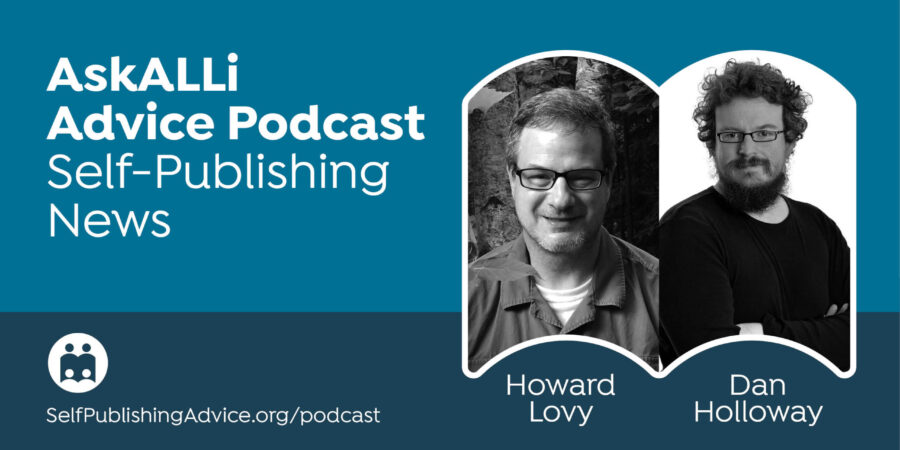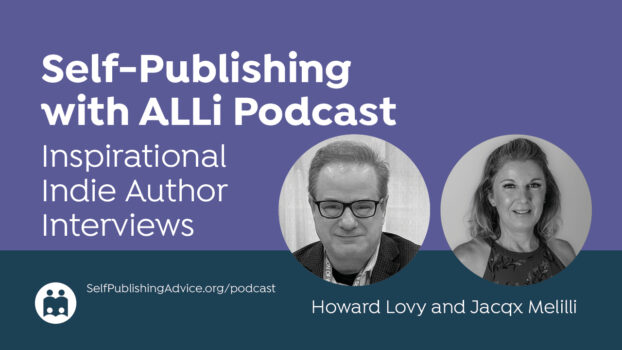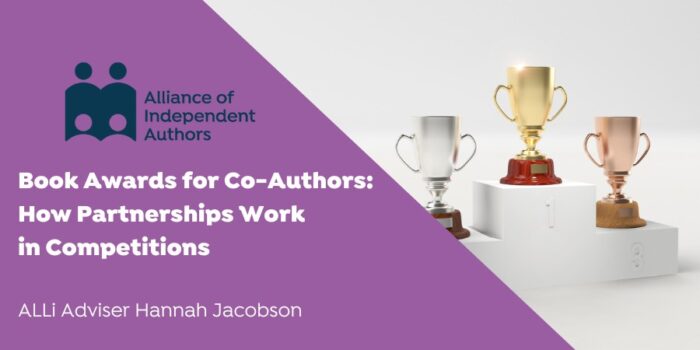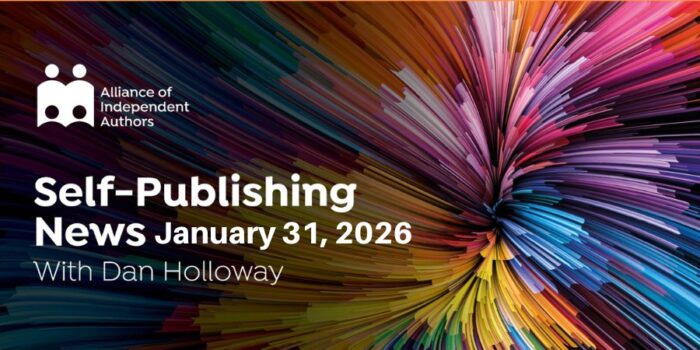Brandon Sanderson, a sci-fi/fantasy author, raised more than $30 million on Kickstarter. And, for some reason, people are really, really outraged that an indie writer, of all people, should attract that much attention and money.
This is among the topics discussed on Self-Publishing News with ALLi News Editor Dan Holloway and News and Podcast Producer Howard Lovy. Together, they will bring you the latest in indie publishing news.
Find more author advice, tips and tools at our Self-publishing Author Advice Center: https://selfpublishingadvice.org, with a huge archive of nearly 2,000 blog posts, and a handy search box to find key info on the topic you need.
And, if you haven’t already, we invite you to join our organization and become a self-publishing ally. You can do that at http://allianceindependentauthors.org.
Listen to Self-Publishing News: Brandon Sanderson and More
On the #AskALLi Self-Publishing News #Podcast, @agnieszkasshoes and @howard_lovy ask: Why are people so upset that Brandon Sanderson raised more than $30M on Kickstarter? Share on XSubscribe to our Ask ALLi podcast on iTunes, Stitcher, Player.FM, Overcast, Pocket Casts, or Spotify.
About the Hosts
Dan Holloway is a novelist, poet and spoken word artist. He is the MC of the performance arts show The New Libertines Earlier this year he competed at the National Poetry Slam final at the Royal Albert Hall. His latest collection, The Transparency of Sutures, is available on Kindle.
Howard Lovy has been a journalist for more than 30 years, and has spent the last eight years amplifying the voices of independent publishers and authors. He works with authors as a book editor to prepare their work to be published. Howard is also a freelance writer specializing in Jewish issues whose work appears regularly in Publishers Weekly, the Jewish Daily Forward, and Longreads. Find Howard at howardlovy.com, LinkedIn and Twitter.
Read the Transcripts: Brandon Sanderson and More
Howard Lovy: Hello and welcome to the March 2022 edition of Self-Publishing News from the Alliance of Independent Authors. I'm Howard Lovy, in Traverse City, Michigan. Joining me from Oxford University is ALLi news editor, Dan Holloway. Hello, Dan, how are you?
Dan Holloway: Hi, Howard. I'm good. How are you?
Howard Lovy: Oh, I'm fine, I'm getting over a cold, but I think it's only a cold, so I should still be safe to travel to London in a couple of weeks for our 10-year anniversary.
Dan Holloway: What's happening in a couple of weeks, I seem to have forgotten?
Howard Lovy: We've only been discussing it for the last month or so, at least, but it's a banner year for us, and I'm happy to travel to London to help celebrate it. But also, while I'm there, we'll record a special episode of Self-Publishing News where we'll talk about the past 10 years and even the next 10 years.
And you were there at the founding, right Dan? What do you remember from that, 10 years ago?
Dan Holloway: I remember at the founding, we were stuffed up in a room right at the top of the building, right at the back, where no one could see us, it was sort of like, oh, there's this weird indie thing going on over there. So, that was the first thing I remember, is they didn't quite know what to do with us, but they knew it was an important announcement, so they couldn't not have us there. I remember we were all very excited. So, there were four of us on the panel that day. So, Orna and I have been both around for 10 years doing that.
The other thing I really remember is Ben Galley in the audience. He was there as an eager listener, and obviously he's gone on and become one of our high-profile indie authors at ALLi. He links in very nicely to our first new story, I think, because he was the first indie I knew who really made a success out of using Kickstarter.
Howard Lovy: Oh, right. Yes. So, let's talk about the news, and so we'll go more into in the next 10 years, or the previous 10 years, when we talk in person and record our next podcast from London.
So, yeah, let's talk about this outrage when indie authors especially, make some money. You're talking about Brandon Sanderson, a sci-fi fantasy author who raised, I think, more than twenty-five million dollars on Kickstarter.
Dan Holloway: I've got it open now. It's really interesting watching it, if you keep the page open, because it literally does tick in front of your eyes. It's going so quickly. It's now, as we speak, it's $32,139,000.79.
Howard Lovy: And for some reason, people are really, really outraged that a writer, of all people, and an indie writer, should attract that much money and attention.
So, tell me a little bit about Brandon Sanderson and why this is such a big deal?
Dan Holloway: Well, it's a big deal because it's a record on Kickstarter, that's the first thing. It's not just a record for authors, but it's a record full stop. So, it's the most successful Kickstarter campaign ever.
It's really kind of cool that the largest Kickstarter campaign ever is a campaign run by a writer. I'm being a bit naive, but I would say rhetorically, I fail to see why that's not a good news story. It just seems fabulous. So, that's the first thing to say.
Howard Lovy: I'm reading a headline, I think, from what is it, Slate Magazine, how angry should other writers be about Brandon Sanderson's $22 million Kickstarter?
I don't know, I'm not angry. Are you angry?
Dan Holloway: No. Kris Rusch has got a really good couple of columns she's written on it, where she basically goes to town on everyone who's been playing him down, because he really has got a lot of hate over it.
He's got a really great post on his website where he's written some FAQ's about why he did it, and also it gives some context.
So, I think a lot of people possibly think it's like these celeb books you see that come out, you know, like the celebrity chef books that come out and they make a fortune, they get a seven-figure advance, they clearly have the book ghost-written, and everyone really resents it and says, oh, make space for the real writers. And I think a lot of people who probably don't know think it's like that.
But this is a guy who's been around writing for ages. He constantly, in his Kickstarter video, he does a really good series of pie charts of how much time he spends on the circuit just going around talking to readers, reading his work out, going to comic cons, just doing all the things you're meant to do and engaging with people and getting them excited about his books. And the reason his campaign has done so well is because readers love reading what he writes, and that just seems to be what writing is about.
Howard Lovy: Right. He earned it. And then people are angry for reasons, including well, there's lack of a gatekeeper. Well, his audience, they're the gatekeeper.
Dan Holloway: Yeah, that's the whole indie thing is that it's about stopping anyone coming between you and your audience, and that's something here he's done really well.
The note of caution that I've sounded in the column, the couple of times I've covered this story, is I can imagine lots of people reading this and thinking, oh, I know what to do, I'll go and try and start a Kickstarter. His blog post on this is a really good, sort of, warning about that and some context for it, that his last few books have all sold between a quarter of a million, and eight thousand copies in their first year.
So, he's not starting from scratch. He's someone who's built an audience and I think, going back to Ben Galley, that's the first thing that he always says is, Kickstarter only works if you've already got an audience, it's not a way to build an audience.
So, his experiment was to see how many of those people would want to buy a new book, not just in year one, but on day one. And it turns out they all do, which is really interesting. So, it has paved the way, but only for people with an existing audience.
I think the other thing we need to be wary of is the next thing we'll see, and this is probably something that John, do you ever do podcasts with John, John Doppler?
Howard Lovy: No, I don't. I haven't.
Dan Holloway: So, if you do, then it's something that to talk to him about, because the next thing that we'll see coming in the Watchdog is a load of PR companies trying to sell services to indie authors saying, that Brandon Sanderson, wouldn't you like a piece of that action? We can help you launch a successful Kickstarter.
So, I can imagine there'll be a whole new scam industry built on the back of it, which is something to watch out for.
Howard Lovy: Right. Which is why ALLi, and especially John Doppler's, services are needed.
I was reading a New York Times story on this when you brought it to my attention, and one paragraph stood out to me. It says, ‘but self-publishing of the scale Sanderson is proposing is an enormously complicated proposition. Fundamentally, most authors want to write books, not run a publishing house.'
It was interesting because, as we know at ALLi, some authors also want to run a publishing business, and we're here to teach them how to do it. It's kind of like the mainstream is, 10 years later, practically discovering what we've known all along.
Dan Holloway: Yes. It's almost infantilizing. It's like, oh, stay out of that, you don't want to do that, and a lot of people do.
Howard Lovy: Right. Exactly. I mean, right, there is a certain percentage of writers who just want to write and let other people handle all that other stuff, but more and more, even traditionally published authors, have to do a lot of their own marketing and their own social media presence, and things like that.
So fundamentally, most authors want to write books, but most authors also know they have to sell books.
Dan Holloway: Yeah, exactly, and a lot of authors also just like meeting readers, especially authors in the fantasy/science-fiction space. It's one of the reasons comic-con's work so well and are such a great way of bringing authors and readers together. And the same with me and poetry, there's nothing better than getting up on stage performing and then meeting people afterwards, handing over a book, talking as you sign it; it's part of the process that a lot of us actually enjoy.
Howard Lovy: Right. So, this is not a get rich quick scheme, it's a possibly make a living slowly scheme. Or you can be like Brandon Sanderson and be in the right place at the right time, having done all this groundwork to begin with.
Dan Holloway: Yeah, exactly.
Howard Lovy: Yeah. Anything else you want to say about Sanderson or that topic?
Dan Holloway: No. I will leave it, other than go and have a look, it's quite fun. As I say, it's quite fun watching it tick over. Let's see how much he has made since, so yeah, whoa, there it goes, that's at least $10,000 since we've been speaking.
Howard Lovy: Since we've been speaking? That's a good payday.
Now, we should also say that this isn't all money for him to spend on sports cars and vacations, this is how he publishes his book.
Dan Holloway: Yes, most of this money will go towards printing costs, design costs, editing costs, formatting. As he said, also, warehousing costs, which is something most of us don't need to think about.
Howard Lovy: Which could be a good segue to our next topic, by the way, which is print-on-demand. And again, this is another case where the mainstream world is discovering what indie publishers have known all along, and that's the world of print-on-demand.
Dan Holloway: This goes back, in a way, to what people were talking about at the Futurebook Conference last autumn, when publishers were talking about the environmental impact of printing, and just how ridiculously wasteful publishing is as an industry. And one of the things that they were realizing there, that we'd sort of realized all along, was that most of the problems in the publishing industry come from returns and come from the fact that they print too many books, and most of them get pulped, or a lot of them get pulped, and they have to be returned to the publishers in order to get pulped. And print-on-demand is far and away the most environmentally friendly form of publishing.
And even since then the case has got even stronger, because the paper shortage and the paper pricing crisis has got worse. So, in the last few months we've seen Italian publishers asking for a tax rebate, for example. We've seen prices go up 30-40% on the cost of paper. So, printing has become really expensive.
And so, a couple of weeks ago, publishers got together, and they had a big industry conference, and it's as though they suddenly discovered it, they discovered that print-on-demand might actually be the answer to their problems and the way to get around some of these costs and some of the negative environmental impact that they're having.
Howard Lovy: Right. Meanwhile, indie authors are like, really, you don't say? We've been doing this for a decade. Yeah.
Dan Holloway: So, I guess one of the things to watch out for is whether this has a knock-on effect on how easy it is for us to print. If publishers suddenly start using all the print-on-demand facilities out there, are we going to end up fighting for space?
Howard Lovy: Oh, really?
Dan Holloway: So, I don't know, that might be one of the impacts it has. But we should certainly, if awareness is being raised through things like this, it's something we can use to point out to readers that we've been doing these things all along, and that actually, they're not just supporting indie authors, but they're supporting a more sustainable way of publishing if they support us.
Howard Lovy: Right. Exactly, and it's just another example of the way that indies have been leading the way in terms of technology, in terms of the supply chain, and then obviously in print-on-demand too.
Dan Holloway: On that, I've read something, I think it was in Tech Crunch, a couple of weeks ago, that reminded us of something that I remember long before ALLi started, which is that the espresso printing machine still exists. Apparently, there are still places where you can use it, which is one of the very first things to use this technology and bring it into the mainstream. So, it's still out there and there are places where it's possible to go into a book shop and have the book printed for you on the premises. Probably people don't even know what an espresso book machine is.
Howard Lovy: Yeah, suddenly I got a hankering for caffeine when you mentioned that, but I think I've heard of it.
Dan Holloway: Yeah, it's like a cross between the printing press and a photocopier. You literally, you type in the ISBN of the book you want and out comes a book, and they still exist apparently, which is really interesting.
So, maybe they are going to start to come back into fashion and we're going to start to see what we thought we might see all those years ago, which is bookstores that are essentially a shop window, and you go in and the bookstore prints your book, which is absolutely fabulous when it comes to thinking about the miles on the clock.
Howard Lovy: So, let's segue to something that involves absolutely no paper and that's audiobooks, and I understand that an indie author has recently won a major Audible award or audiobook award?
Dan Holloway: Yeah. So, this is just a nice bit of news. So, I first reported on it when Mary Jane Wells was shortlisted for the Audie Awards. There were 125 books shortlisted, in 25 different categories, and she was the only indie author to be listed, which was quite great for her, but quite damning. But she's subsequently gone on to win, which was absolutely brilliant news. So, that was for her audiobook called, Heroine.
And it won in the best original category, and it's a really good example of an indie project because Mary Jane Wells is a playwright and voice actor, so ideally placed to record her own work in an indie way.
Howard Lovy: Right, absolutely. So, she did it herself?
Dan Holloway: Yes, she did it all herself. And the platform she used is a platform called Authors Republic, which I checked, and it has a recommended rating from John Doppler on the ALLi Watchdog.
Howard Lovy: Wonderful, and she's a playwright too, so she writes in a way that sounds good to the ear?
Dan Holloway: In a way that works well as an audiobook, yes.
And it's also interesting to note that the overall winner at the Audi's was the latest audiobook from Andy Weir who, like so many, started out as a famous indie author.
Howard Lovy: Right. He writes the science fiction stories.
Dan Holloway: Yes. So, The Martian was the book that made him famous. The book that won was called Project Hail Mary.
But it feels like it's been a good news month, we normally spend our time moaning about Amazon, but actually this has been really good news month.
Howard Lovy: So, speaking of good news, I look forward to actually meeting you in person. What are some of the things that you hope to accomplish at the London Book Fair?
Dan Holloway: Oh, I have no idea. It's always a weird experience. It depends. I have no preconceptions, I think. Mainly just catching up with people, I guess.
Howard Lovy: Yeah. I mean, I'm going to be annoying with my microphone. I'm going to interview various people, members of ALLi, other indie authors, and just get a feel for the pulse of indie publishing 10 years later, and that'll be the subject of next month’s Self-Publishing News Podcast.
Dan Holloway: Super.
Howard Lovy: So, until then, have a wonderful few weeks, and I'll see you soon.
Dan Holloway: And I'll see you soon. Take care.





